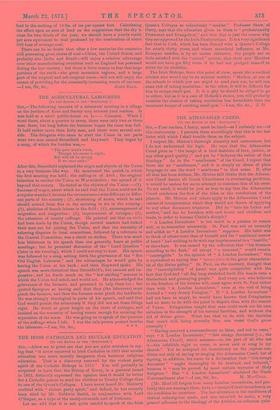THE IRISH CATHOLICS AND SECULAR EDUCATION. [To THE EDITOR OF
THE " SPECTATOR."] SIR,—Allow me to point out that you are quite mistaken in say- ing that "it never occurred to Irish Catholics in 1869 that secular education was more morally dangerous than heretical religious education. That is a discovery reserved for the violent party -spirit of the Catholic Bishops in 1873." You will probably be surprised to learn that the Bishop of Kerry, in a pastoral issued in 1862, distinctly expressed the opinion that it would be better ,for a Catholic parent to send his children to Trinity College than to one of the Queen's Colleges. I have never heard Dr. Moriarty credited with " violent party spirit," and indeed, he has recently been cited by Mr. Goldwin Smith, in conjunction with Lord O'Hagan, as a type of the unobjectionable sort of Irishman.
Let me add that it is not quite candid to speak of the Irish Queen's Colleges as colourlessly " secular." Professor Shaw, of Derry, says that the education given in them is " predominantly Protestant and Evangelical," and that that is just the reason why they are approved by the Irish Presbyterians. It is a very significant fact that in Cork, which has been blessed with a Queen's College for nearly thirty years, and where sacerdotal influence, as Mr. Ronayne testifies, is by no means obtrusive, the people are so little satisfied with the "mixed " system, that their new Member would not have got fifty votes if he had not pledged himself to strive for its abolition.
The Irish Bishops, from this point of view, speak like a medical adviser who would say to an anxious mother, " Madam, at one of the schools to which you are urged to send your son, he will run some risk of taking scarlatina ; at the other, it will be difficult for him to escape small-pox. It is a pity he should be obliged to go to either, but as it is a case of Hobsoit's choice, you will probably consider the chance of taking scarlatina less formidable than the imminent danger of catching small-pox."—I am, Sir, &c., J. D.


































 Previous page
Previous page